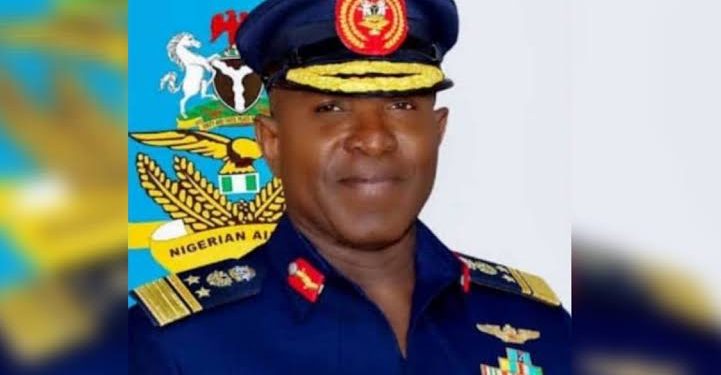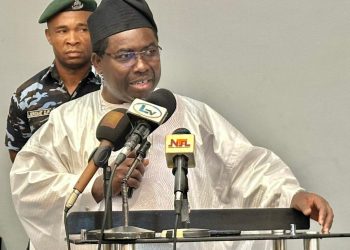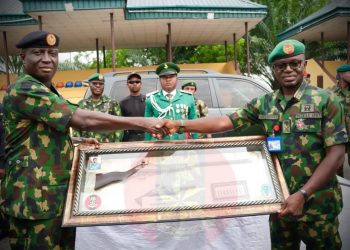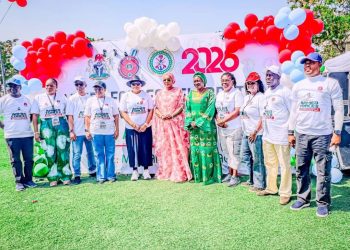By Nkechi Eze
The Nigerian Air Force (NAF) has reiterated its commitment to transparency and public engagement by providing a comprehensive update on its operations, acquisitions, engineering achievements, and welfare improvements over the past two years. The update was delivered during the Expanded Defence Headquarters Media Chat in Abuja, where the Chief of Air Staff ably represented by Air Vice Marshal Edward Gabkwet addressed media executives and the Nigerian public.
In the briefing, AVM Gabkwet emphasized that the NAF is not only committed to defending the nation’s airspace but also to ensuring that Nigerians are kept informed about the institution’s evolving capabilities, challenges, and progress. He noted that the past two years have witnessed a deliberate transformation of the service into a more agile, responsive, and multidimensional force, capable of executing air operations independently and in joint missions with sister services.
To demonstrate growth in capability, he revealed that the Nigerian Air Force acquired 15 new aircraft within the period under review. These include six T-129 ATAK helicopters, two AgustaWestland AW109 Trekkers from Italy, three Beechcraft King Air aircraft, and four Diamond surveillance aircraft. He added that an additional 49 aircraft are expected to be delivered by 2026, which include three CASA 295 transport aircraft, ten more AW109 Trekkers, twelve AH-1Z Viper attack helicopters, and 24 M-346 fighter-trainer jets.
In terms of air operations, he disclosed that the NAF flew over 4,670 hours in 2,713 sorties during the last year alone, supporting more than 2,600 kinetic and conversion missions. From January to May this year, over 2,000 flight hours were recorded across 900 sorties in over 1,000 operational engagements. These figures, AVM Gabkwet noted, reflect not just the scale but the intensity of air operations currently being executed in support of national security.
As part of its accountability efforts, the NAF reported the neutralization of 3,496 terrorists and the destruction of 175 structures and 218 combat vehicles linked to insurgent groups, especially under Operation Hadin Kai in the Northeast. The NAF also played a critical role in supporting ground troops and halting insurgent logistics networks.
In the Niger Delta, the NAF air component of Operation Delta Safe contributed to improved oil production security through consistent air patrols and targeted strikes, helping reduce oil theft and sabotage. These operations have been credited with helping Nigeria’s oil production rebound to pre-crisis levels in 2023.
AVM Gabkwet also shared engineering breakthroughs as evidence of the Air Force’s growing self-reliance. He noted that NAF engineers recently completed Nigeria’s first-ever 4,800-hour inspection on a Dornier 228 aircraft. They also reactivated a similar aircraft that had been grounded for 33 years, along with other platforms such as two AW109 helicopters and an ATR-42 surveillance plane. Several others ranging from a Super Puma helicopter to a Citation 680 jet and additional surveillance aircraft are currently being restored to service.
These technical milestones have enabled the NAF to maintain an average serviceability rate of 72 percent in the last two years, allowing for sustained operations across multiple conflict zones. “We want Nigerians to know that we are not just buying aircraft; we are also maintaining, restoring, and maximizing them through local expertise,” he said.
To address past mistakes and improve operational responsibility, the Air Force recently launched a Civilian Harm Mitigation and Response Action Plan (CHMRAP), a policy document designed to minimize unintended civilian casualties and guide the ethical application of air power in conflict zones.
On personnel welfare, Gabkwet disclosed that the NAF has initiated 482 infrastructure projects over the past two years, including housing and administrative buildings. This has led to a 25 percent reduction in the Air Force’s housing deficit, with a goal to reach 50 percent reduction by mid-2025.
AVM Gabkwet concluded by assuring Nigerians that the Air Force is dedicated to not only protecting the country but also remaining open about its operations, achievements, and areas for improvement. “We are committed to ensuring Nigerians are not left in the dark. Our activities affect the people, and it is their right to know what we are doing to keep them safe,” he said.
The media engagement forms part of the Defence Headquarters’ ongoing civil-military outreach programme aimed at fostering trust, accountability, and collaboration between the Armed Forces and the Nigerian public.
















